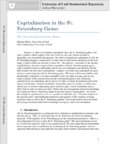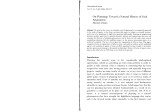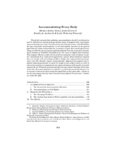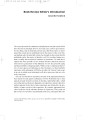1 - 25 of 20
| Creator | Title | Description | Subject | Date | ||
|---|---|---|---|---|---|---|
| 1 |
 | Newman, Lex | Descartes on unknown faculties and our knowledge of the external world | Descartes introduces his skeptical arguments, in the First Meditation, in an order of increasing strength. First, the narrator-meditator notices that judgments concerning the nature of small and distant objects are unreliable; later, that even sensory judgments about large and close objects are in d... | Corporeal existence; Skeptical argument | 1994 |
| 2 |
 | Battin, Margaret P. | Legal physician-assisted dying in Oregon and the Netherlands: evidence concerning the impact on patients in "vulnerable" groups | If physician-assisted suicide (PAS) and/or voluntary active euthanasia were legalised, would this disproportionately affect people in ‘‘vulnerable'' groups? Although principles of patient autonomy and the right to avoid suffering and pain may offer support for these practices, concerns about the... | Vulnerable groups; Oregon; Netherlands | 2007-10-01 |
| 3 |
 | Kukathas, Chandran | Multiculturalism of Fear (Book Review) | Reviews the book "The Multiculturalism of Fear," by Jacob Levy. | Books; Multiculturalism; Fear | 2003-10-16 |
| 4 |
 | Thalos, Mariam G. | The lens of chemistry | Chemistry possesses a distinctive theoretical lens?a distinctive set of theoretical concerns regarding the dynamics and transformations of a perplexing variety of organic and nonorganic substances?to which it must be faithful. Even if it is true that chemical facts bear a special (reductive) relati... | 2012 | |
| 5 |
 | Mallon, Ronald | Odd couple: the compatibility of social construction and evolutionary psychology | Examines the significance of evolutionary psychology and social constructionism in social sciences. Role of philosophical disputes in generating universal and local emotional phenomena; Relevance of adopting different theories of meaning and reference; Competition between philosophical disputes and ... | Emotions; Genetic psychology; Social Sciences, Philosophy | 2001-09-11 |
| 6 |
 | Millgram, Elijah | Who was Nietzsche's genealogist? | Nietzsche's Genealogy of Morals is deservedly part of the ethical canon, but it is also enormously and insistently absent-minded. I'm going to first present, as a textual puzzle, a handful of forgetful moments in the first two essays of the Genealogy. To address the puzzle, I will take up a familiar... | 2007-07 | |
| 7 |
 | Battin, Margaret P. | Continuous sedation until death: moral justifications of physicians and nurses─a content analysis of opinion pieces | Continuous Sedation until Death (CSD), the act of reducing or removing the consciousness of an incurably ill patient until death, often provokes medical-ethical discussions in the opinion sections of medical and nursing journals. A content analysis of opinion pieces in medical and nursing literature... | 2012-01-01 | |
| 8 |
 | Thalos, Mariam G. | Capitalization in the St. Petersburg Game: why statistical distributions matter | In spite of its infinite expectation value, the St. Petersburg game is not only a gamble without supply in the real world, but also one without demand at apparently very reasonable asking prices. We offer a rationalizing explanation of why the St. Petersburg bargain is unattractive on both sides (to... | 2013-01-01 | |
| 9 |
 | Francis, Leslie | Recent developments in genetic diagnosis: some ethical and legal implications | This essay outlines some of the ethical complexities genetic technology poses in two areas of decision-making: when to perform genetic testing and what to do with the information gained from genetic testing. | Genetic Technology; Genetic Testing; Ethics | 1986 |
| 10 |
 | Battin, Margaret P. | Age rationing and the just distribution of health care: is there a duty to die? | These lines express a view again stirring controversy: that the elderly who are irreversibly ill, whose lives can be continued only with substantial medical support, ought not to be given treatment; instead, their lives should be brought to an end. It should be recognized, as one contemporary politi... | 1987 | |
| 11 |
 | Battin, Margaret P. | Age-rationing and the just distribution of health care: Is there a duty to die? | The author analyzes the argument that a policy involving distributive justice in the allocation of scarce health care resources, based on the strategy of rational self interest maximation under a veil of ignorance (Rawls/Daniels), would result in an age rationing system of voluntary, socially encour... | Health care providers; Death; Euthanasia | 1987-01 |
| 12 |
 | Battin, Margaret P. | Report of the committee on physician-assisted suicide and euthanasia | In 1994 the Board of the American Association of Suicidology selected a Committee on Physician-Assisted Suicide and Euthanasia. It was asked to review the issues emerging in the growing controversy concerning euthanasia, physician-assisted suicide, palliative care, and the medical treatment of dyin... | Suicidology; Palliative care | 1996 |
| 13 |
 | Thalos, Mariam G. | On planning: toward a natural history of goal attainment | The goal of the essay is to articulate some beginnings for an empirical approach to the study of agency, in the firm conviction that agency is subject to scientific scrutiny, and is not to be abandoned to high-brow aprioristic Philosophy;. Drawing on insights from decision analysis, game theory, gen... | 2008 | |
| 14 |
 | Newman, Lex | Descartes' epistemology | René Descartes (1596-1650) is widely regarded as the father of modern Philosophy;. His noteworthy contributions extend to mathematics and physics. This entry focuses on his philosophical contributions in the theory of knowledge. Specifically, the focus is on the epistemological project of Descartes... | Descartes; Philosophy;; Epistemology | 2005-04-14 |
| 15 |
 | Crowe, Benjamin D. | On the track of the fugitive Gods: Heidegger, Luther, Holderlin | At each of the decisive turning points in his philosophical career, Heidegger found inspiration in Holderlin. More recently, commentators have raised questions about the role that his reading of Holderlin played in Heidegger's political actions of the 1930s. It has been suggested that Heidegger's... | Philosophy;; Theology; Religion; Nationalism | 2007 |
| 16 |
 | Francis, Leslie | Roles of the family in making health care decisions for incompetent patients | This article is about the roles of the family in making health care decisions for incompetent patients. It argues that complex moral reasons call for the participation of families in decision making for incompetents. However, these moral reasons do not support a single model of the family's role for... | Family; Health Care Decisions; Patients; Family Rights | 2006-06-16 |
| 17 |
 | Thalos, Mariam G. | From human nature to moral Philosophy | In this essay I've illustrated the effects of exposing the question of the self to empirical scrutiny, showing that it leads to a partial dissolution of the manifest image. And that this, in turn, leads to seeking articulation of the relationship between moral and political Philosophy;, as to whethe... | Self; Empiricism; Moral Philosophy;; Political Philosophy | 2002 |
| 18 |
 | Francis, Leslie | Accommodating every body | This Article contends that workplace accommodations should be predicated on need or effectiveness instead of group-identity status. It proposes that, in principle, "accommodating every body" be achieved by extending Americans with Disabilities Act-type reasonable accommodation to all work-capable me... | 2014-01-01 | |
| 19 |
 | Battin, Margaret P. | On the structure of the euthanasia debate: observations provoked by a near-perfect for-and-against book. Review symposium on euthanasia and physician-assisted suicide | Something is amiss with the euthanasia debate, and I want to use a smart new book to try to show what it is. The book is Euthanasia and Physician- Assisted Suicide: For and Against, an eagerly awaited volume by three well-known philosophers, Gerald Dworkin, R. G. Frey, and Sissela Bok. Dworkin a... | Physician assisted suicide; Killing and letting die; medical profession | 2000 |
| 20 |
 | Battin, Margaret P. | Review essay, on the structure of the euthanasia debate: observations provoked by a near-perfect for-and-against book | Something is amiss with the euthanasia debate, and I want to use a smart new book to try to show what it is. The book is Euthanasia and Physician-Assisted Suicide: For and Against, an eagerly awaited volume by three well-known philosophers, Gerald Dworkin, R. G. Frey, and Sissela Bok. Dworkin and F... | 2000 |
1 - 25 of 20
